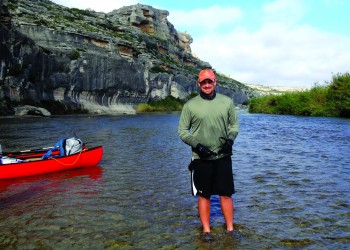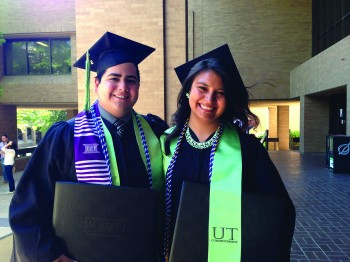GeoFORCE Turns 10
October 22, 2014
Building a diverse workforce and changing young lives
By Angela Curtis

At first glance, the two problems may seem unrelated: The geosciences are facing a growing labor shortage, and many talented high school students in underprivileged areas of Texas aren’t realizing their full potential.
The Jackson School of Geosciences is addressing both issues with a single program—GeoFORCE. The program takes high school students from two disadvantaged areas of the state—inner-city Houston and rural Southwest Texas—on field trips for four summers, visiting geologically significant sites around the country. As a result, potential geologists are introduced to the profession, and students from disadvantaged areas find a path to college and rewarding careers.
The program also addresses an industry dilemma. A 2014 report from the American Geosciences Institute predicts nearly half of geoscientists will retire by 2022. Combine that with a booming industry and a lack of geoscience students—especially those from diverse racial backgrounds—and you have a profession at a crossroads.
“If we are going to meet the challenge of meeting the growing labor shortage of geoscientists, then we have to be inclusive in providing opportunities such as GeoFORCE that provide students the experience and information needed to make informed choices about careers in the geosciences,” said Samuel Moore, director of outreach and diversity at the Jackson School.
Eighty percent of GeoFORCE participants are members of minority groups. Since its inception, GeoFORCE has been a robust success, delivering: 100 percent high school graduation; 96 percent college matriculation; 94 percent sophomore persistence; 64 percent college STEM (science, technology, engineering, math) majors—more than double the national average; and 16 percent college geoscience majors—more than 50 times the national average.
GeoFORCE is more than an introduction to the geosciences. The program offers high school students advice on applying for college and help preparing for the SAT and ACT. After high school, GeoFORCE helps students transition to college and the workforce.
What’s Geology?
“Before GeoFORCE, I didn’t know what geology was,” said Victoria Fortiz, a GeoFORCE alum and current Jackson School senior.
That’s part of the problem, said Eleanour Snow, associate director of outreach and diversity at the Jackson School.
“Students are not hearing about geosciences when they’re in high school,” she said. “The really smart kids who are very good at sciences don’t know this is another option for them because what they see is AP biology, AP physics, AP chemistry, and they think that’s it.”
Now Fortiz, a first-generation college student from Eagle Pass, is on the verge of graduating, with plans to go to graduate school to study geological oceanography.“
GeoFORCE gave me my career path,” she said.

GeoFORCE alum Marissa Vara, who grew up in Uvalde, graduated from the Jackson School in May 2014 with a degree in geological science. She interned with the Texas Commission on Environmental Quality this summer and plans to sail on an Antarctic research expedition in October. Afterward she plans to attend graduate school and become a marine geologist.
When Vara first learned about GeoFORCE, her father was reluctant to allow his youngest child to travel far from home, but her mother encouraged her to take advantage of the opportunity.
“Truthfully, I was not particularly excited about spending a week looking at rocks, so I viewed the first two years of GeoFORCE as an opportunity to obtain new life experiences, like taking my first plane ride,” Vara recalled. “It was during my junior-year trip to Oregon, however, that I became hooked on geology.”
That’s a common trajectory, said program assistant Ann Merriman.
“It’s amazing to see the change in what they’re learning and taking out of the experience,” Merriman said.
At the end of every year, students write essays about their experiences. During their first couple of years, students tend to focus on the life skills they developed during the trips—remembering to bring their cellphone chargers, packing their bags and setting their alarms. That focus shifts during their final years in the program.
“By the time they’re older, they’re talking more about being confident in their science knowledge and academic skills,” Snow said.
Jeff Sitgreaves of Bracketville was the program’s first geology graduate. Sitgreaves earned his undergraduate degree in 2013 from the Jackson School, where he is now attending graduate school. He interned this summer at ExxonMobil and plans to pursue a career in the energy industry.
“I wouldn’t be in the geosciences if it weren’t for GeoFORCE,” Sitgreaves said. “My first year, I thought, ‘This is kind of interesting.’ The second year, ‘This is cool.’ Then by the third year, ‘Yes, this is what I want to do.’ ”
More information about GeoFORCE is available here.
***
Keeping GeoFORCE Going
Now entering its 10th year, GeoFORCE aims to raise money for an endowment to help it continue in perpetuity. The endowment was kick-started by a $500,000 matching grant from an anonymous donor, and ConocoPhillips has pledged a $50,000 matching grant. The Jackson School of Geosciences must raise dollar-for-dollar matching funds by Aug. 31, 2015.
“Thanks to annual gifts from companies, foundations and individuals, we have been able to provide this opportunity every year for the past decade. If we want to ensure that GeoFORCE is sustained in future decades, building an endowment is essential,” said Samuel Moore, director of outreach and diversity at the Jackson School.
GeoFORCE needs stable, recurring revenue to supplement support from companies, foundations and individuals, which can fluctuate from year to year. “The endowment will make sure the program is there even if times get rough and annual contributions slow down,” said Eleanour Snow, associate director of outreach and diversity.
Contribute to GeoFORCE by clicking “Make a Gift” at www.jsg.utexas.edu, or contact Karen Cochran at kcochran@jsg.utexas.edu or 512-471-6010.
Back to the Newsletter